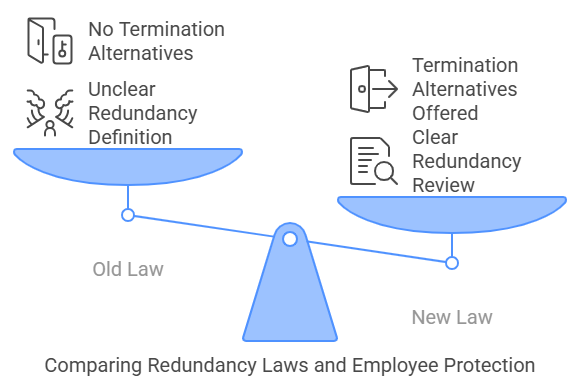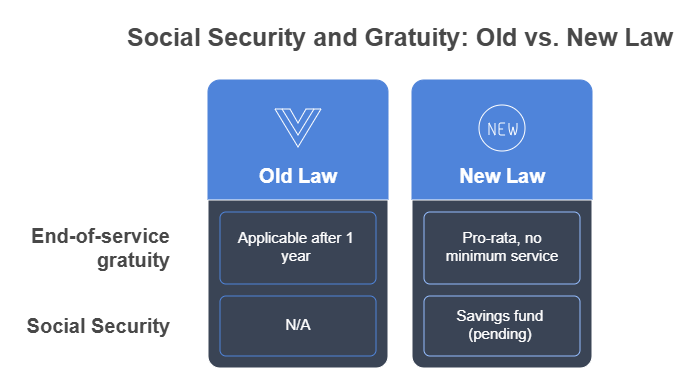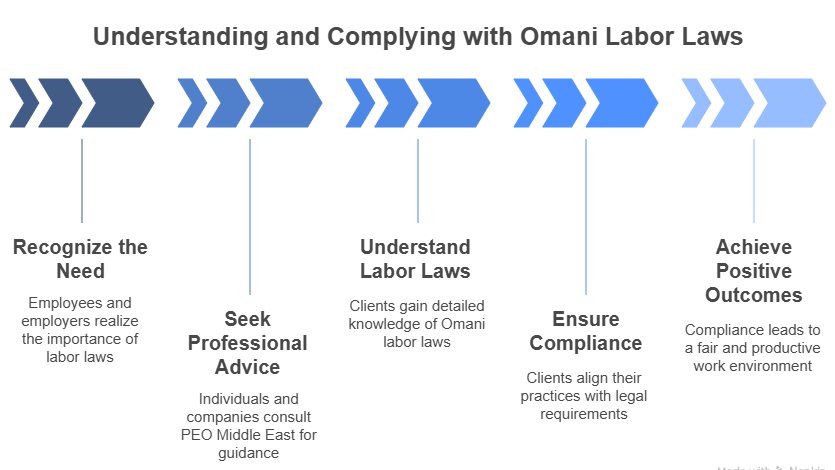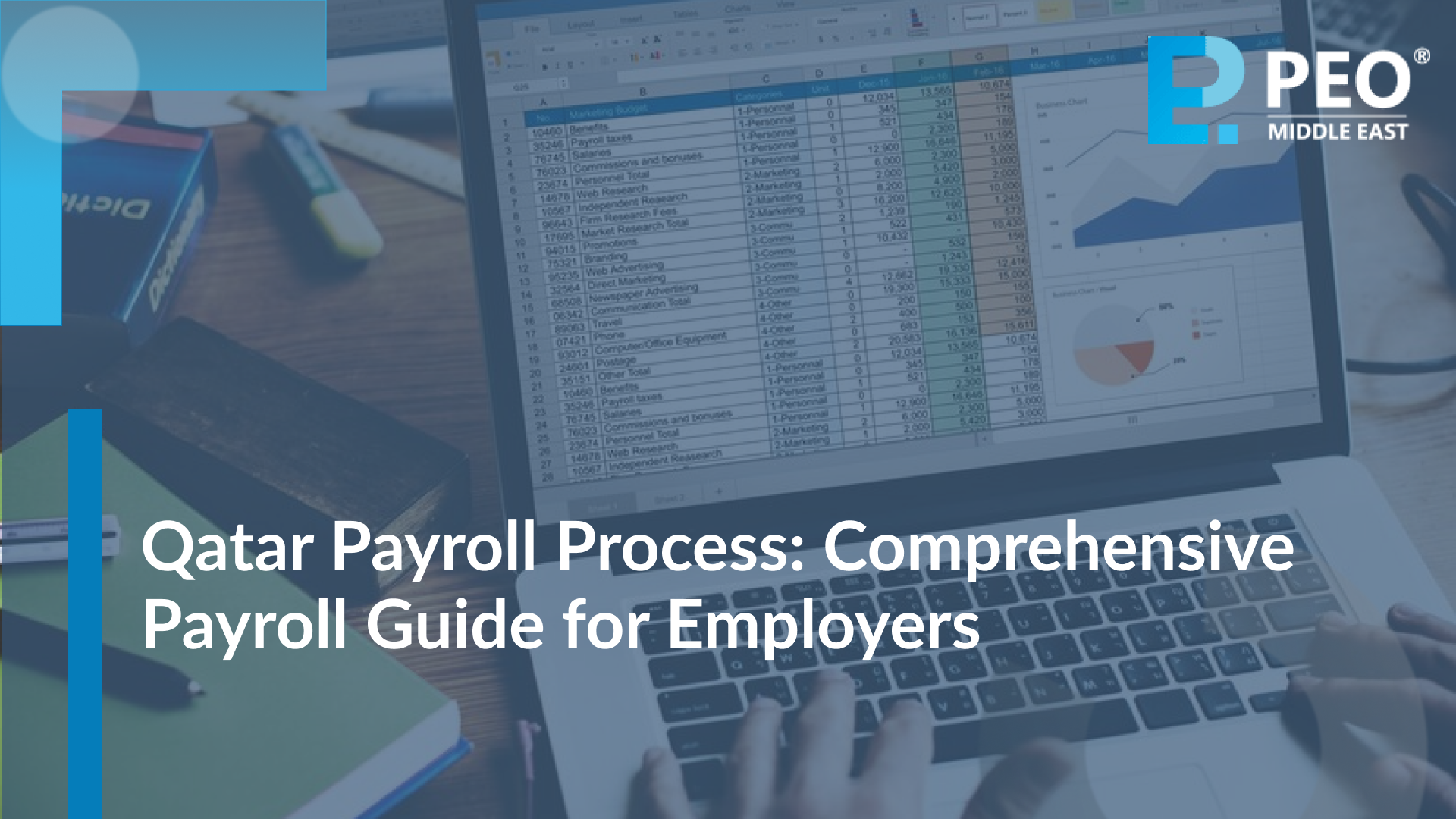The long-awaited changes to Oman labor law are finally over. They have been officially implemented with the issuance of Royal Decree 53/2023 on July 25, 2023. The good news, this new law came into effect the next day. It proved to be a significant transformation in the country’s employment environment. These amendments align with Oman’s Vision 2040. Oman’s vision aims to enhance economic sustainability. Meanwhile, promotes job creation for local nationals. The new law replaces the previous Royal Decree 35/2003, which introduces important modifications. This highlights the rights and obligations of Oman’s employers and employees.
To help both parties, we penned down this article. The article covers everything you need to know about new regulations regarding Oman labor law.
This article will highlight the:
- Key updates to Oman’s Labor Law,
- Providing a detailed analysis of the implications
- How PEO Middle East help to understand these new updates
Get ready to know how it going to be beneficial for businesses and workers alike!
Key Changes in Oman Labor Law:
Oman has gone through several changes in their labor laws. According to the changes made, we have outlined those amendments below:
1. Changes to Fixed-Term Contracts:
Oman’s new law has changed the outlook of fixed-term contracts. The most prominent change is how contracts for fixed-term are handled. Fixed-term contracts were converted into unlimited-term contracts upon renewal. It was done previously. The New Law, however, changes this dynamic:
| Old Law | New Law |
| Fixed-term contracts convert to unlimited-term contracts upon renewal. | Fixed-term contracts no longer convert automatically. However, it becomes unlimited after 5 years of continuous employment. |
If an employee continues working under a fixed-term contract for more than 5 years as per the new law. In this scenario, the employee contract will automatically transition to an unlimited term. However, the contract will not convert, if the employee decides to leave before five years.
2. Restructured Leave Provisions
The new law has made several changes to leave entitlements for employees. Some of the most notable updates are as follows:
| Leave Type | Old Law | New Law |
| Accompanying a Patient | No entitlement | 15 days per year for Omani nationals to accompany a patient (spouse or direct relative up to the second degree). |
| Special Leave | Not specified | Special leave without pay is available upon employer consent; the employee bears all social security contributions during the leave period. |
| Paternity Leave | Not specified | 7 calendar days of paternity leave for male employees. |
| Sick Leave | 10 weeks total | Increased to 182 calendar days with tiered pay: 100% for the first 21 days, 75% from days 22–35, 50% from days 36–70, and 35% from days 71–182. |
| Unpaid Special Leave | Not specified | Unpaid “special” leave for emergencies with no time restrictions, but employee covers social security contributions. |
| Maternity Leave | 58 days | Increased to 98 days. |
| Childcare Leave | Not specified | Unpaid childcare leave for up to 1 year. |
3. Secondment
Another significant update is the introduction of a provision allowing employers to temporarily assign employees to work for another employer. This aims to streamline business operations and reduce the dependency on foreign labor.
| Old Law | New Law |
| No provisions for secondment. | Allows temporary assignments to another employer under specific conditions. |
 4. Termination and Redundancy
4. Termination and Redundancy
The new Oman labor law has brought in several important changes concerning employee termination and redundancy practices.
- Termination for Poor Performance: Employers can terminate employees for poor performance as per new law. Provided the employee has been notified of the performance issues. Along with the condition she/he has not improved within six months.
- Unfair Termination: Unfair termination compensation is now capped at 12 months’ salary. This is a reduction, as previously it was a minimum of three months’ salary.
- Anti-Discrimination Provisions: The New Law expressly prohibits termination on the grounds of certain areas. These include gender, race, and ethnicity. Along with, religion, disability, and pregnancy. However, it may contain parental duties such as breastfeeding.
| Ground for Termination | Old Law | New Law |
| Poor performance | Not specified | Allowed if the employee is notified and fails to improve within 6 months. |
| Unfair termination compensation | No cap, minimum 3 months’ salary | Capped at 12 months’ salary. |
| Anti-discrimination clauses | Not specified | Explicit prohibition on termination due to gender, race, religion, disability, pregnancy, etc. |
5. Redundancy and Economic Termination
Employers can now terminate employees due to economic reasons. A committee will review redundancy requests and offer alternative solutions. The committee is composed of representatives from the Ministry of Labour and other relevant agencies. The requests may be as reducing working hours or salaries. Instead of laying off workers.
The redundancy requirements are as follows:
| Old Law | New Law |
| Redundancy due to financial loss is not clearly defined. | Redundancy requests due to economic reasons must be reviewed by a committee. Employers must consider alternatives like reducing working hours or salaries before resorting to terminations. |
For any discrepancy, employees can refer their case to the Ministry of manpower labor complaints. This way, they can get better solution to their problem by law.
6. Omanisation
Omanisation—the strategy to increase the employment of Omani nationals—is further emphasized in the New Law:
- Employers must submit annual workforce localization strategies to the Ministry of Labour (MOL)
- Employers are required to promote the recruitment of Omanis in specific sectors. They are permitted to terminate non-Omani employees. Also, they are allowed to replace them with Omani nationals.
- Businesses must also create and implement training plans to prepare Omani employees for leadership positions.
| Old Law | New Law |
| No specific requirements for Omanisation strategies. | Employers must submit yearly Omanisation plans detailing Omani employee count, wages, and job positions. |
7. Working Hours
The new Oman labor law introduces a reduction in daily working hours. Employees worked from 8.5 hours to a maximum of 8 hours per day previously. However, 40 hours per week excluding breaks as per the hours.
| Old Law | New Law |
| Daily working hours: 8.5 hours | Reduced to 8 hours per day. |
8. Social Security and Gratuity
Changes have also been made. In regards to the end-of-service gratuity and social security contributions:
- According to the new law, it removes the 1-year service requirement for the payment of end-of-service gratuity. Employees now receive a gratuity for even part of the year worked.
- The new Social Protection Law will establish a savings fund, but the effective date is still pending.
| Old Law | New Law |
| End-of-service gratuity is applicable after 1 year of service. | Pro-rata end-of-service gratuity applies. Even for employees who complete less than 1 year of service. |
9. Non-Compete Clauses
In employee contracts, employers may now include non-compete clauses. They are only for those with access to sensitive business information. For instance, such clauses can last up to two years. They are limited to the geographical areas in which the employer operates.
| Old Law | New Law |
| Non-compete clauses are not clearly defined. | Non-compete clauses can be enforced for up to two years, restricted to relevant business regions. |
PEO Middle East: Get Assistance and Detailed Understanding on Omani Labor Laws
Oman is an ideal place to start off a career or make career advancement. However, before jumping to grab a job, the employee must understand their rights and obligations. Particularly in the light of new labor laws. Without knowing them, they can’t benefit from it. Failure to comply is another issue that they may face. As an Omani National, one should also know about what is needed and meet so that he/ she never leaves behind. Not only employees but employers are also required to know the Oman labor laws. The awareness brings a positive environment. A fair treatment prevails within the workforce. Resulting in better outcomes.
As per the new amendment made, Oman has witnessed few changes in the labor laws. From salary payments to changes in contract limits, there are several areas where Oman has introduced changes. It’s difficult to know them and understand them as they are. Thus, the need for a professional advisor arises. You can take guidance from a reputed Middle Eastern agency like PEO Middle East.
The PEO Middle East has been working for years and bringing a productive impact on the professional lives of its clients. They not only assist employers but also support employees as well. You can get detailed help on every Middle Eastern country’s labor law. From Oman to Bahrain and from Qatar to Saudi Arabia. Their team is catering to clients from different Middle East countries at a time.
Ready to be compliant with Omani labor laws? Hire PEO Middle East today. Let yourself be fully compliant and aligned with what labor law has said for you!
The Takeaway
The changes introduced by the Oman Labor Law are substantial. It reflects the government’s desire to promote fairness. Coupled with economic diversification. A way to bring greater opportunities for Omani nationals in the workforce. However, these changes require careful attention from businesses. This way, they can ensure compliance with the new provisions. Especially regarding employee rights and termination processes. As a result, they can better understand Omanisation strategies.
As the implementing regulations are expected in the coming months, businesses should stay informed about the specific operational guidance to ensure a smooth transition and implementation. Legal professional consultancy is highly recommended. Their assistance helps businesses and employees understand the full impact of these changes.
Feel free to contact our team of experts for further information. Quick assistance is all you need to navigate these changes. While providing detailed advice based on your specific situation.
This overview covers the essential updates under the new Oman Labor Law. Staying well-informed is essential whether you are an employer or an employee. It guarantees that you make the most of these legislative advancements. Embrace the change and align accordingly in the country’s evolving labor market.


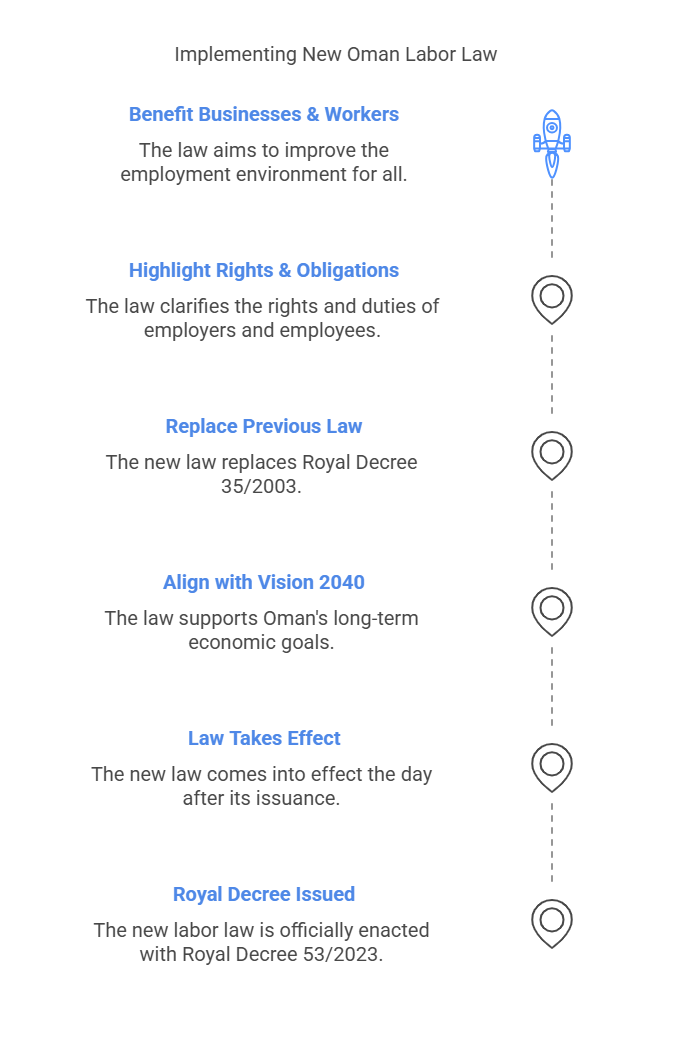
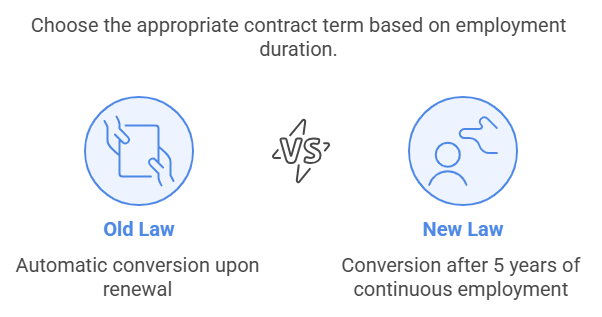
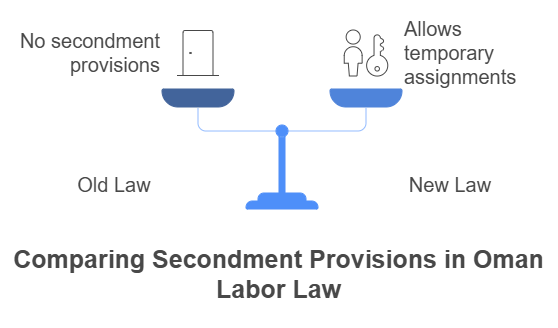 4. Termination and Redundancy
4. Termination and Redundancy